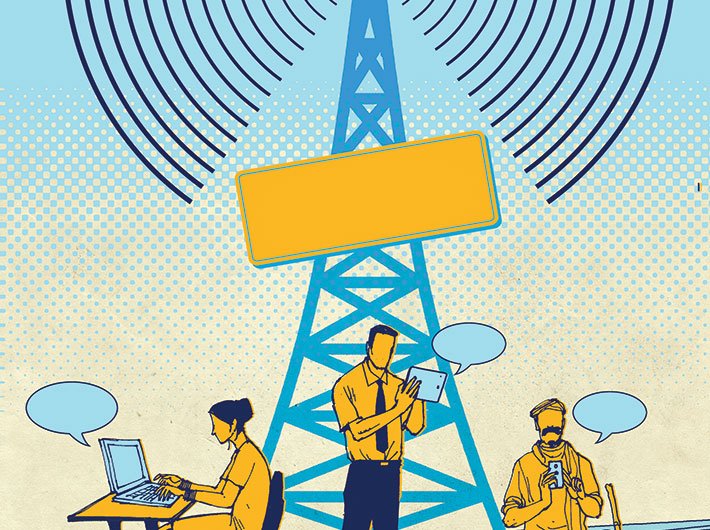Call drops may come down, but industry is not pleased given the high reserve price
The union cabinet headed by prime minister Narendra Modi has approved the sale of all available spectrum. The move apart from adding lakhs of crores to the government’s coffers is also being regarded as a solution to the ever increasing problem of call drop. Over 2,000 MHz spectrum will be made available for auction across seven bands – 700 MHz, 800 MHz, 900 MHz, 1,800 MHz, 2,100 MHz, 2,300 MHz and 2,500 MHz. “This will be the biggest spectrum auction ever held in the country,” finance minister Arun Jaitley said.
The premium 700 MHz band will be put up for auction for the very first time. According to the Telecom Regulatory Authority of India (TRAI), the band is capable of offering high-speed coverage of wireless internet, even inside buildings, which will boost the digital governance segment of the government. Moreover, the band, due to its lower frequency, provides wide coverage which reduces the number of towers required for setting up the network. Thus, for the industry, the band effectively cuts down capital expenditure involved in the process of erecting towers. The cost of delivering mobile services in the 700 MHz band is around 70 percent cheaper than in the 2,100 MHz band used for 3G services.
Looking at the growing number of telecom users in the country, the step seems positive. But the industry is not so pleased by the decision. Why?
The cause is the high reserve price of the spectrum. The 700 MHz band has a reserve price of Rs 11,485 crore for one megahertz. This is the most expensive among the seven bands available. As the band is the most sought-after, its price set by TRAI has upset the industry. Earlier, the industry requested the regulator not to put this band for sale but in vain. Telecom experts feel that the ecosystem that would support such an efficient spectrum is still immature in India. This means there are limited devices available in the Indian markets that support technology deployed under 700 MHz band. And so, experts believe, it makes no sense for the service providers to buy it now and wait for years for the ecosystem to get mature.
Therefore, it is speculated that the upcoming auction, scheduled in September, would not see an aggressive bidding for the 700 MHz band. Rajat Mukherji, chief corporate affairs officer, Idea Cellular, feels that “extremely strained” balance-sheet of the telecom industry is the reason behind this. Notwithstanding the industry’s constraints, the government is hoping to earn Rs 5.66 lakh crore from about 2,000 megahertz airwaves that is being put up for sale.
It would be interesting to see how India’s biggest spectrum auction takes shape.
Meanwhile, the cabinet has sent back for reconsideration TRAI’s recommendation on lowering the spectrum usage charges (SUC) to three percent. The charge is annually levied on the operators’ revenue. The government in 2014 decided to cap SUC at 5 percent for spectrum that was to be procured in future auctions. The result of it is still awaited. However, Mukherji believes the charge is not justified since it only adds to the burden on the industry already facing financial crunch.
By making the entire spectrum available in the market, the government has tried to address one of the issues the telecom industry is facing. But on ground, the operators are still struggling to erect towers, a basic infrastructural requirement to carry network, Mukherji feels. In recent test drives conducted by TRAI across India it was found that several operators were violating the standard call drop rate, which is two percent. The poor quality of telecom services is also linked to lack of infrastructure on ground.
Union minister for communications and IT Ravi Shankar Prasad is clearly making efforts to address the issue. Recently, Prasad announced that 2,000 mobile towers will be erected in Chhattisgarh. On the other hand, TRAI in June issued a consultation paper to address issues faced by operators to provide in-building coverage in residential areas. Suggestions by TRAI included sharing of infrastructure by various operators in a building and making telecom infrastructure as an “essential infrastructure” for new structures and structures under renovation. The move if implemented properly can resolve the current network problem users are facing.
[email protected]
(The article appears in the July 1-15, 2016 issue)



